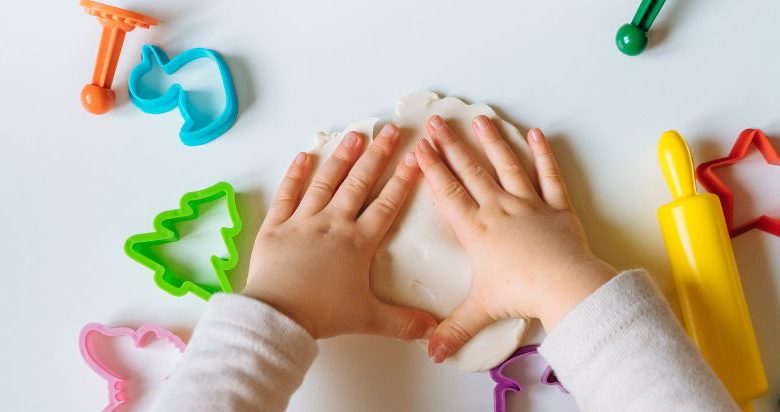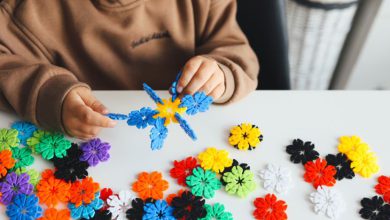Developing Fine Motor Skills: Fun and Educational Activities For Preschoolers

Developing Fine Motor Skills: Fun and Educational Activities For Preschoolers
Fine motor skills is a term you have probably often heard as your child grows. Whether it be at your pediatricians office, daycare, preschool, or your friend who happens to be a therapist. It’s one of those terms that parents hear but may not completely understand. In this post, we will cover the importance of fine motor skill development and some fun activities to help your child increase their abilities.
Why Is Fine Motor Skill Development Important For Preschoolers?
Fine motor skill development in preschoolers is a pretty big deal. First off, fine motor skills are all about those little movements that involve using small muscles, like the ones in the fingers, hands, and wrists. Think of it as your preschooler’s “superpower” to do all the nifty stuff like picking up tiny objects, holding a crayon to draw masterpieces, or even buttoning up their shirts like a pro.
You might be wondering, why should we care about these small moves? Well, these skills are like building blocks for life. When kids develop their fine motor skills, it’s like setting the stage for future success.
These skills are crucial for everyday activities, from tying shoelaces to zipping up a jacket. They help them become more independent and boost their confidence. Plus, when they can handle those fine movements, it’s like a magic door opens to a whole world of creativity and self-expression. Watch them draw their imaginary worlds or craft some pretty cool artwork—it’s incredible to witness!
They also goes hand in hand with a preschooler’s cognitive and language development. As they scribble and cut with scissors, their brains are working hard, making connections and improving their problem-solving abilities.
And let’s not forget about the social aspect too. When your preschooler is engaged in fine motor activities with other kids, they learn to share, take turns, and cooperate. It’s like a little teamwork training camp right there.
So, there you have it—fine motor skills are like the secret sauce of early childhood development. They pave the way for independence, creativity, and improved brainpower. Plus, they help kids become little ninjas at handling everyday tasks.
4 Skills That Are Developed Through Fine Motor Development
Fine motor development helps preschoolers develop a range of essential skills that are crucial for their overall growth and success. Here are four key skills that are developed through fine motor development.
Hand-Eye Coordination: Fine motor activities require kids to use their hands and fingers in coordination with their eyes. Whether they’re stringing beads, drawing, or stacking blocks, the brain and muscles work together to accomplish the task. This skill is not only useful for specific activities but also forms the foundation for various sports and other physical activities later in life.
Dexterity: They aid in refining the dexterity of the fingers and hands. As children manipulate small objects, they enhance their ability to use their fingers with precision and control. This refined dexterity is valuable for tasks that demand intricate hand movements, like playing a musical instrument or typing on a keyboard.
Hand Strength: Engaging in activities that require fine motor skills helps to strengthen the muscles in the hands and fingers. Think of it like a workout for those tiny muscles! Having strong hands enables children to perform various tasks with ease, such as writing for extended periods or opening jars when they get older.
Pencil Grip and Writing Skills: Fine motor development plays a significant role in shaping a child’s ability to hold a pencil and write. Through activities like drawing, coloring, and using scissors, they gradually develop the coordination and muscle control necessary for forming letters and shapes, setting them on the path to becoming confident writers.
How A Preschool Environment Helps Fine Motor Development
The preschool environment plays a vital role in helping children develop their fine motor skills in various ways. If you suspect your child having any issues with their fine motor skills, and have been on the fence about whether or not to send them to preschool, consider checking out a facility such as Little Sunshine’s Playhouse and Preschool! With trained teachers and environments structured specifically for your aged child, you will be impressed with the improvement you see! Here are some of the ways preschool environments can help develop these skills.
Structured Fine Motor Activities
Preschools often incorporate structured activities specifically designed to target fine motor skills. Teachers may organize activities like finger painting, cutting with scissors, playing with playdough, using tweezers to pick up small objects, or lacing beads—all of which help kids refine their finger movements and hand coordination.
Art and Craft Stations
Preschool classrooms often have dedicated arts and crafts stations with a wide range of materials, such as crayons, markers, stickers, glue, and various art supplies. Engaging in arts and crafts activities encourages children to use their fine motor skills while drawing, coloring, cutting, pasting, and creating various crafts.
Manipulative Toys and Games
Preschools typically provide access to a variety of manipulative toys and games that challenge children’s fine motor skills. Building blocks, puzzles, stacking toys, and sorting games all require precise hand movements and finger dexterity.
Playground Equipment
Many preschools such as Little Sunshine’s Playhouse and Preschool have playgrounds equipped with age-appropriate structures like monkey bars, climbing walls, and swings. Engaging in outdoor play on this equipment can help children develop hand strength and coordination.
Sensory Play
Sensory play is an essential part of the preschool environment, as it engages multiple senses, including touch. Play with sensory materials like sand, rice, water, or shaving cream provides opportunities for children to use their fingers and hands in different ways, enhancing their fine motor skills.
Pre-Writing Activities
Preschool teachers often introduce pre-writing activities to help children develop the foundational skills needed for writing. These activities include tracing lines and shapes, forming letters with finger paint, or using chalk on a chalkboard.
Daily Routines
Everyday routines in the preschool environment, such as self-help tasks like buttoning shirts, zipping backpacks, or pouring drinks during snack time, also contribute to fine motor skill development. These routine activities allow children to practice and refine their fine motor movements.
Teacher Guidance and Support
Preschool teachers play an important role in facilitating fine motor skill development. They provide guidance, encouragement, and hands-on support to help children build confidence and refine their skills.
6 Fun And Helpful Fine Motor Activities For Preschoolers
“Play is often talked about as if it were a relief from serious learning. But for children, play is serious learning. Play is really the work of childhood.” -Fred Rogers
While there are endless opportunities and stations in preschool environments such as those found at Little Sunshine’s Playhouse and Preschool, we have some fun activities for you to try with your child while at home too! Fine motor skills activities for kids can be both enjoyable and beneficial. Here are six fun and engaging activities to help children develop their fine motor skills at home:
-
Finger Painting Fiesta
Let’s get messy and creative! Finger painting is not only super fun but also a fantastic way to strengthen those little fingers. Provide non-toxic finger paints and large sheets of paper. Encourage kids to use their fingers to create colorful masterpieces. They can swirl, dot, and make all sorts of funky patterns. Plus, it’s a great sensory experience! If you are home on break take the paints outside and let them make as big of a mess as they want! Or if it’s winter, try using food coloring in the snow with paintbrushes.
-
Playdough Playtime
Who doesn’t love playdough? It’s a classic and versatile activity that kids adore. Hand them some colorful playdough and let their imagination run wild! Rolling, pinching, shaping, and squishing the dough helps improve hand strength and dexterity. They can even create their own playdough sculptures! As they get older give them words such as their name to shape the dough into. It takes fine motor skills to be able to pinch and roll those letters.
-
Stringing Beads Bonanza
Time to unleash the jewelry makers! Provide a collection of large beads and a shoelace or a string with a knot at one end. Kids can have a blast stringing the beads onto the lace to create beautiful necklaces or bracelets. It’s an excellent activity for refining hand-eye coordination and concentration. You can find large beads to cut down on choking hazards if that is a concern. Or try using Cheerios or colored cereals to make an edible fine-motor treat.
-
Scissor Skills Showdown
Grab some child-safe scissors and let the cutting extravaganza begin! Offer different materials to cut, like old magazines, colorful paper strips, or even playdough snakes. Cutting helps kids develop their hand muscles and fine-tune their cutting skills. If you recycle your colorful birthday party tissue paper, have them cut up the tissue paper and glue it onto paper for colorful masterpieces! Just make sure to supervise them during scissor time.
-
Clothespin Clips
Gather a bunch of wooden clothespins and a container. Decorate the clothespins to make it more exciting. Kids can practice their pincer grip by using the clothespins to pick up small objects like pom-poms or beads and drop them into the container. It’s a fantastic way to boost finger strength and coordination. You can turn it into a game to see how many objects can be picked up in 30 seconds. You’d be amazed at how into the game they become!
-
Sticker Party
Stickers are a pure delight for kids! Get a variety of stickers, and let them stick away. You can provide them with a sticker book, or they can stick the stickers on paper to create their artwork. This activity helps enhance hand-eye coordination and fine motor control while keeping them entertained.
The key to helping your child develop their fine motor skills is to keep it playful and encourage kids to have fun! These activities not only foster their physical development but also nurture creativity and imagination. The preschool environment, whether at school or at home, is designed to be a rich and stimulating setting that encourages preschoolers to engage in various activities that promote their fine motor skills. By providing a combination of structured activities, open-ended play opportunities, and supportive teaching, you can create an environment where children can thrive and develop their fine motor abilities with confidence and joy.





